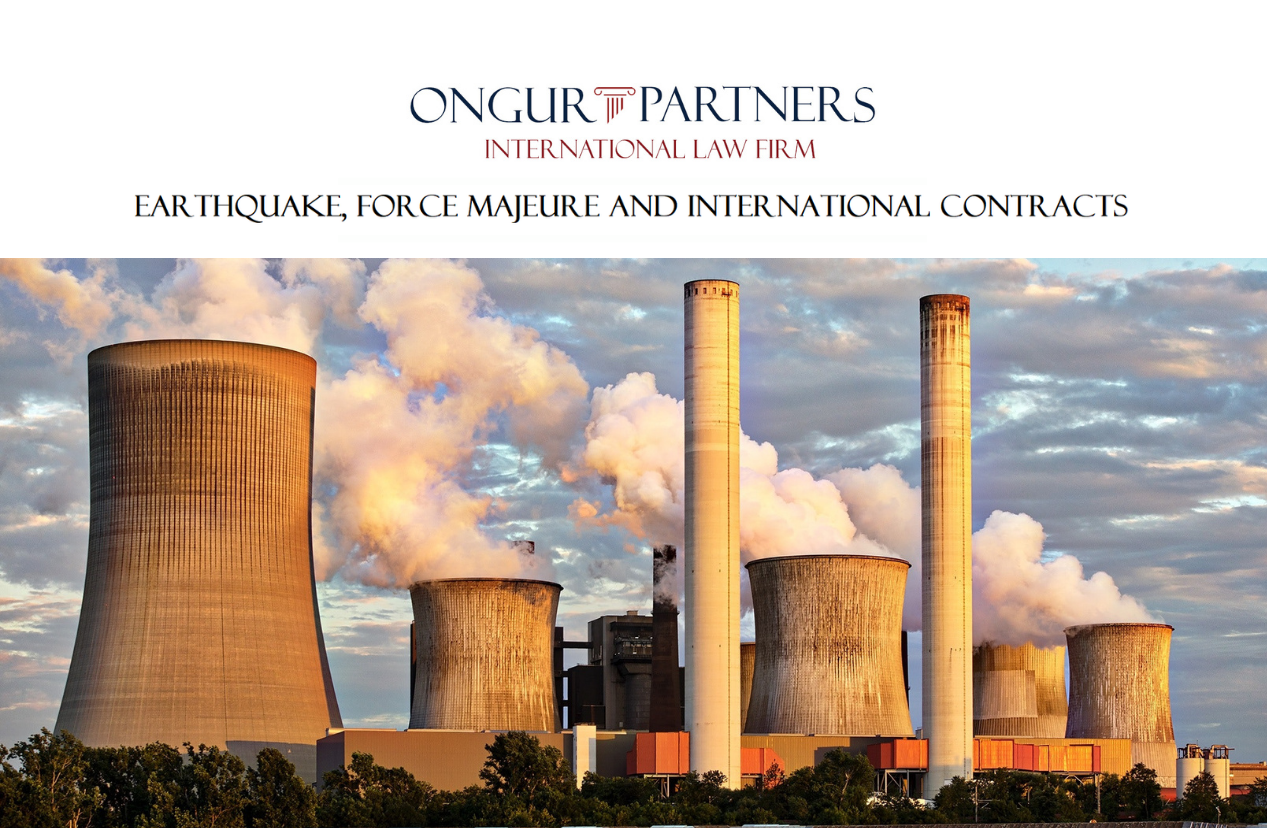Att. Dr. Arzu ONGUR
Att. Dr. Selva KORKMAZCAN IŞIK
Att. Gökberk TEKİN, FCIArb
Introduction
On 6th of February, 2023, Türkiye was struck by two significant earthquakes that have impacted eleven provinces in the region, including Kahramanmaraş, Hatay, Adıyaman, Osmaniye, Gaziantep, Şanlıurfa, Malatya, Diyarbakır, Adana, Kilis, and Elazığ.
These events resulted in a tragic loss of 50.096 lives, and 227.027 structures were severely affected. Other than the loss of lives and housing, the earthquake has also had a tremendous impact on economic activities within the region, caused by infrastructure destruction, production halt, and supply chain disruptions. As a result, many businesses still face challenges in fulfilling their contractual obligations within the agreed timeframes.

This inevitably leads to disputes between parties located in different jurisdictions where the dispute resolution clauses predominantly provide for international arbitration, in which “an event of force majeure” will necessarily be invoked.
In this information note, we will explore the legal implications of force majeure clauses in international contracts where one of the parties is a Turkish business who is unable to perform the contract due to the impact of Türkiye earthquakes.
Existence of a force majeure clause in the contract
To begin with, there is no doubt that an earthquake is a natural disaster that falls within the category of an event of force majeure, as they are unforeseeable events beyond anybody’s control that can cause widespread and severe disruptions to various activities.
Still, the presence and wording of a force majeure clause in the contract will play a crucial role. If a force majeure clause exists in the contract and encompasses earthquakes, the affected party could assert a force majeure claim, which might allow this Party to be temporarily relieved from performance obligations or enable the termination of the contract without facing penalties or damages, depending on the extent and duration of the event of force majeure.
Non-existence of a force majeure clause in the contract
If, however, there is no force majeure clause or earthquakes are not explicitly mentioned, whether the affected party can successfully invoke force majeure depends additionally on the governing law of the contract and the seat of arbitration. In many jurisdictions and industries, earthquakes are explicitly recognized as force majeure events, either through specific contractual language or legal principles. Thus, even in the absence of explicit mention, courts and arbitration tribunals may interpret earthquakes as force majeure events based on their impact, severity, and their classification as events beyond a party’s control.
In particular, civil law jurisdictions including Türkiye, which are based on codes and statutes, allow for a broader interpretation of force majeure beyond what is explicitly listed in the contract. In these jurisdictions, legal principles and concepts of “impossibility” or “frustration of purpose” are considered to determine the applicability of force majeure events, including earthquakes. For instance, if a party’s business is completely destroyed to the extent that it becomes impossible for them to perform their obligations, the legal principle of contract frustration comes into play even in the absence of a force majeure clause.
Contract frustration occurs when an unforeseen event makes performance of the contract impossible or radically different from what was initially agreed upon. In such cases, the contract might be automatically terminated, and both parties are relieved from further performance.
In common law systems, such as those found in the United States, the United Kingdom, and Australia, courts often interpret force majeure clauses according to the intent of the parties and the context of the contract. This might involve considering industry norms, business practices, and legal precedents. If an event like an earthquake is commonly understood to be a force majeure event within a specific industry, a common law court or an arbitration tribunal that applies the laws of a common law country might imply it as such, even if not explicitly stated in the contract.
It must also be noted that, within the framework of applicable law, as well as local statutes and regulations, the provisions outlined in the United Nations Convention on Contracts for the International Sale of Goods (CISG) hold significance for international sale of goods contracts . This is particularly true due to the Convention’s ratification by 94 countries. It is not uncommon to observe the CISG’s application to sales contracts originating from these nations, especially within the context of arbitration proceedings.
For the purpose of this note, it’s worth noting that the CISG incorporates an inherent force majeure clause, potentially providing enhanced benefits to the affected party. More precisely, as per Article 79 of the CISG, the seller is relieved from the obligation to provide compensation if it can demonstrate that the obstacle was beyond its control and was not reasonably foreseeable at the moment the contract was established, like the earthquakes subject to this post.
In summary, It’s important to emphasize that the precise treatment of earthquakes as force majeure events can vary based on the governing law of the contract, industry norms, and the specific circumstances of each case. If a contract contains a force majeure clause, parties should carefully review the clause’s wording to ascertain whether earthquakes are explicitly listed as force majeure events. Even if earthquakes are not specifically listed but are recognized as such based on legal principles or industry customs, they may still be invoked as force majeure events in particular scenarios. If disagreements arise regarding force majeure, termination, or contract amendments, seeking legal advice from experts familiar with international contract law and the governing jurisdiction is advisable.


